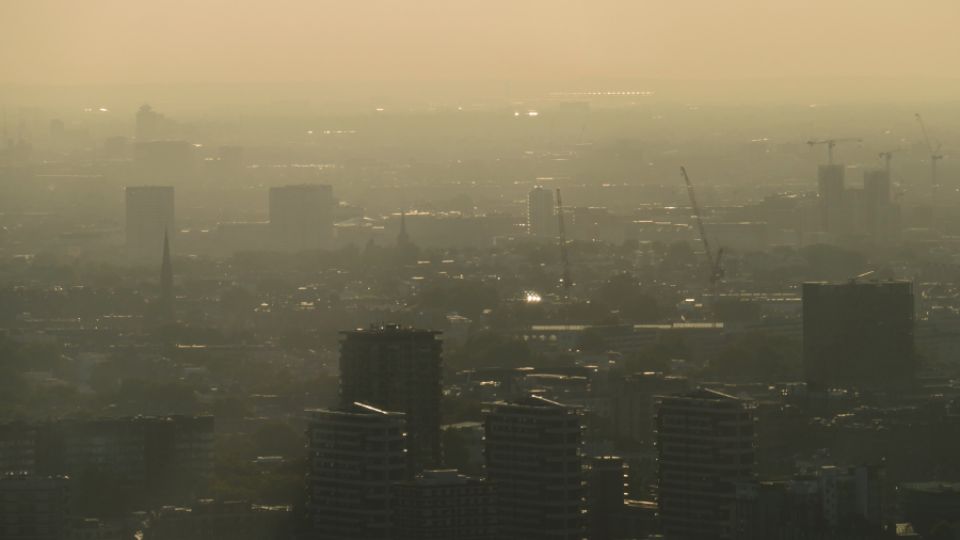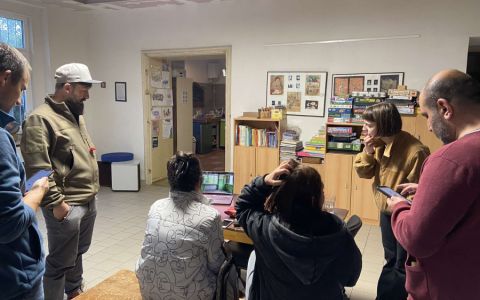For the last few days, Karaganda was covered with a thick blanket of smog. Residents of the city shared photos and videos on social networks, where you can see the “air” we breathe with the naked eye.
Data provided by the public monitoring system Airkaz proved exorbitant exceedances of PM2.5. These particles cause cardiovascular, respiratory and cancer diseases and other health issues. Because of their small size, they float in the air for a long time, readily penetrate the lungs and enter the bloodstream. PM2.5 concentrations are an important indicator of air quality and health hazards. According to World Health Organization (WHO) standards, the average daily level of PM2.5 should be no more than 25 micrograms per cubic meter. On January 19, the sensor installed near Bukhar Zhyrau Avenue and Komissarov Street showed 612 mcg/m3! It decreased to 320 in the evening, leaving the value still very high.
The World Air Quality Index characterized the air in Karaganda as “Very Unhealthy” and “Hazardous”. Governments worldwide usually declare an “emergency situation” in those moments and recommend limiting the time spent outdoors and using respirators. Such levels are very dangerous for children and adults with respiratory diseases, especially asthma.
60,000 tons of pollution – annually!
The main sources of emissions in Karaganda and other cities in Kazakhstan are divided into three main groups:
- industrial enterprises,
- automobile transport,
- private sector (heating).
Approximately 750 enterprises in Karaganda operate more than 4,000 emission sources emitting 50,000-60,000 tons of pollutants into the air annually. Emissions produced by cars also affect air quality. The number of transport in the city is growing. And the share of transport that runs on diesel fuel has increased. About 150 thousand cars were registered in Karaganda in 2020.
The impact of heating in the private sector on air pollution in the city is observed everywhere (the city is "in the ring" of emissions from boilers and household stoves in the private sector), and the maximum contribution to air pollution in the residential area is observed from boilers and household stoves in private sectors of Maikuduk, Prishakhtinsk and Kirzavod-1,2 area. When assessing the impact of the private sector on air pollution, one should also consider such a factor as the low height of the chimneys of furnace heating in private houses. Furthermore, Karaganda residents use low-quality coal that does not meet the certification characteristics.
Exploring fuel poverty
To prevent bad air quality, Karaganda needs a reliable and accessible system with an operational warning system for monitoring air quality. Consequently, the city needs to develop a municipal air improvement program with measurable indicators, deadlines, and mandatory funding for implementation measures. The roadmap for integrated solutions to Karaganda Region's environmental problems is insufficient. Improving the public transport system in the city and developing alternative modes of transport would also help to keep the air clean.
Also, tightening government control over emissions and environmental protection measures is necessary, including control over the fuel quality used for heating. By the way, using “dirty” fuels (coal, fuel oil, wood, etc.) is one of the fuel poverty indicators. That is why the state must develop and implement state programs to support vulnerable populations to connect to gas networks.
What can everybody do?
There are simple steps each of us can make:
- Be active and take a civic stand! Demand from the representatives of the authorities to solve the problem of air pollution, namely to identify who is the main contributor to air pollution, and to make proposals to change the situation, to develop appropriate measures and to include in the general action plan of the region, for example to develop the same program to improve the air in the cities of the region, and primarily in Karaganda.
- Conduct public environmental monitoring of air quality.
- Participate in the decision-making process on environmental issues.
- Those faced with choosing a boiler for their home - prefer environmentally friendly ones.
- Those who have already installed a dirty boiler - think about replacing it with an alternative boiler. If you can connect to the gas main - go for gas heating.
- Those who buy coal and note that the coal is delivered low-quality - to initiate an appeal to the bodies of consumers’ rights protection with a demand to check the unscrupulous suppliers selling fake coal!
! Important information!
Since last year in Karaganda, one-time social assistance for connection to the central gas is provided. The amount is up to 100 MCI (318 thousand tenge), depending on the cost of connecting and installing gas equipment. One-time social assistance for gasification will be provided to vulnerable groups of people (retirees, persons with disabilities, large families, etc).








